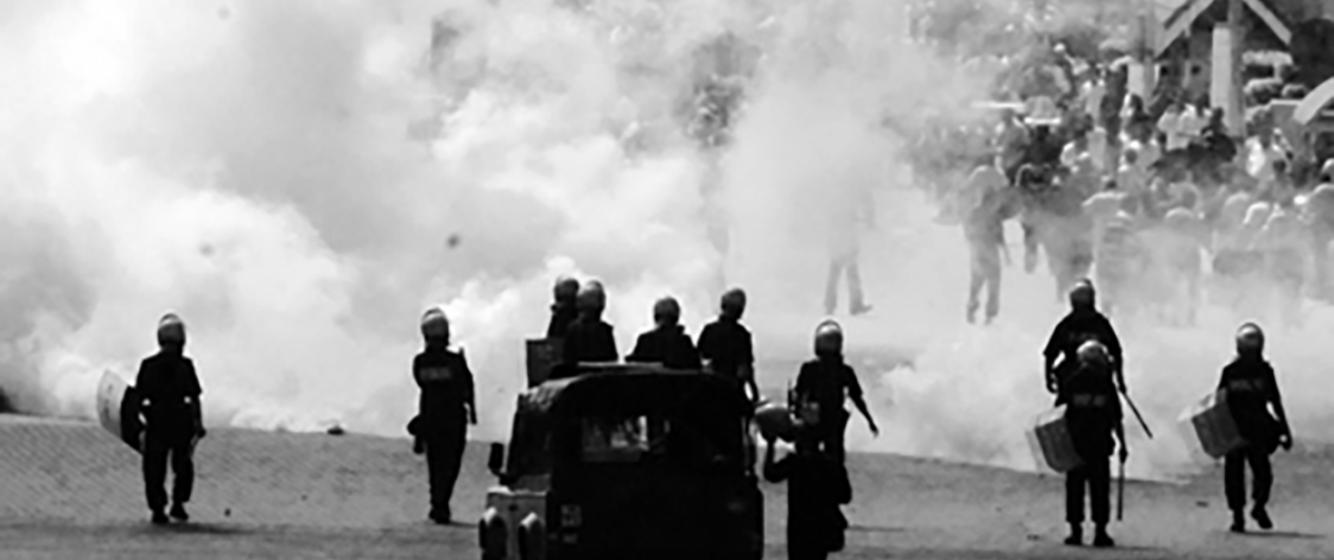
Malaysian Counter-insurgency (Photo from Wikicommons)
The ‘Captive Mind’ and Counterinsurgency in Malaysia: An Exploratory Study
This post seeks to explore the question of colonial legacies that remain operative and, in some ways, even obstruct the production of critical studies of protest policing in postcolonial Malaysia.
Using Alatas’ definition of a “captive mind” being “an uncritical and imitative mind dominated by an external source, whose thinking is deflected from an independent perspective,”[1] this post problematizes the field of Malaysian social studies by introducing an empirical case study on Malaysian protest policing. Specifically, it looks at the BERSIH 2.0 street protests in Kuala Lumpur between 2011 and 2016.
It is important to note that there is little or no research on protest policing strategies/models in Malaysia. This empirical case study makes a contribution in terms of its analysis of tactical transformations deployed by the state and the police, based on participant observation and interviews with the police and protesters. The empirical data collected reveals that the Malaysian postcolonial experience in protest and public order policing remains heavily connected to late colonial British Malayan counterinsurgent policing practices. At the same time, we must acknowledge that the concepts prevalent in contemporary social research on models of protest policing were developed by Anglo-American and European scholars. Concepts such as “escalated force,” “negotiated management,” and “strategic incapacitation” may be useful in helping to make sense of the Malaysian contemporary policing experience. Nevertheless, they cannot get the presenter/researcher off the hook, when critiqued in the light of Alatas’ concept of the captive mind. Caught between the absence of critical scholarship on policing in Malaysia and the reliance on Western concepts of protest policing to get this Malaysian empirical study off the ground, is there any possibility or potential for topics that are steeped in colonial legacies (such as this one) to escape mental captivity or academic imperialism?
By engaging with Alatas’ writings on the captive mind, one is forced to think much more critically about what we actually mean by “critical studies on Malaysian policing.” On the one hand, the police institution in Malaysia’s late colonial and postcolonial history enjoys a largely unchallenged legitimacy and prestige (gained through nationalistic retellings of the central role played by the police in defeating the communist insurgency during the Malayan Emergency, 1948-1960). This may explain why homegrown critical scholarship on protest and public order policing may be lacking or, at best, remain marginal. Conversely, a simple employment of Western concepts on protest policing to study the Malaysian experience is also highly problematic. Developments in protest policing in Malaysia cannot be reduced to any simple narrative of the Malaysian police playing “catch-up” with their Anglo-American counterparts, who are perceived to have more “democratic” forms of policing. Instead, public order policing in Malaysia today – despite some developments deemed to be “progressive” – is actually a refinement and intensification of colonial modes of public order policing, one refitted for Malaysia’s 21st-century neoliberal developmental needs. The potential for unsettling Malaysian social scholarship, built uncritically on assumptions of national development and social progress, remains a vital possibility when one engages with the thought and writings of Syed Hussein Alatas.
[1] Alatas, Syed Hussein. 1974. “The Captive Mind and Creative Development.” International Social Science Journal 26(4): 691-700.
Add new comment